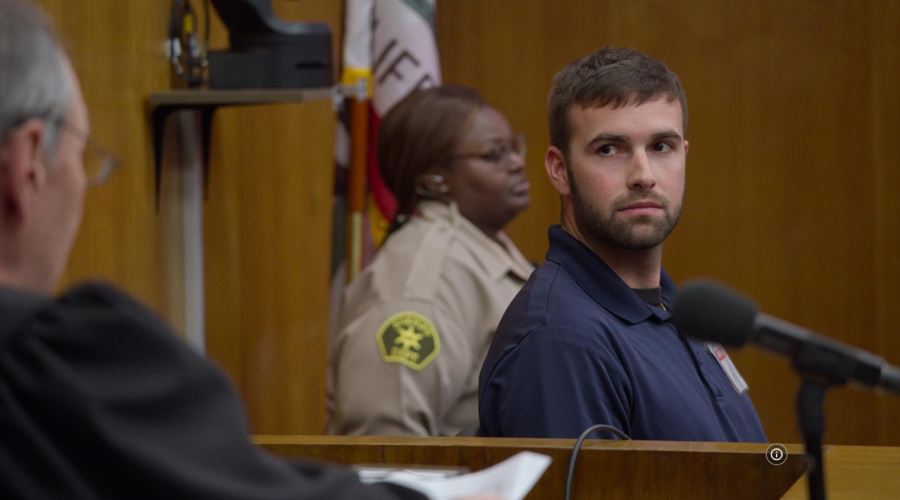Everyone in the entertainment industry wants to be part of something innovative that people love. However, when The Office alumni Gene Stupnitsky and Lee Eisenberg pitched the idea of a comedy based on a fake jury trial, the only platform willing to take a chance was the little-known Amazon Freevee (free, ad-supported streaming from the conglomerate).
Jury Duty has a style like The Office, but combines it with reality TV, in an elaborate world like the movie The Truman Show. It turned out to be a gamble that risked ending very badly.
The main character who didn’t know the truth
The series revolves around Ronald Gladden, a solar contractor who wanted a change in his life and responded to a Craigslist ad. He thought he would be participating in a documentary about the jury duty experience, but the reality was very different from what he imagined: in Jury Duty, everything is fake. Everyone is an actor who adapts to his reactions, without him suspecting it.
Although Gladden knows he is being recorded in certain situations, there are hidden cameras that follow his movements throughout the day in the courtroom, until the last episode when they reveal the truth.
“The best way I can describe it is sensory overload. I had a feeling in my gut the whole time that something wasn’t right. Like, this can’t be real,” Gladden said in an interview for Amazon.
That he didn’t find out what was going on helped the production to continue, otherwise they were in danger of losing the entire work.
James Marsden as an exaggerated version of himself
Most of the actors in Jury Duty have a low enough profile to avoid raising Gladden’s suspicions, but James Marsden (Enchanted, Westworld) comes across as himself, in a performance that earned him an Emmy nomination.
“The idea of lampooning the cliché of entitled, self-absorbed, egocentric Hollywood actor was really exciting to me,” Marsden said in an interview. “I could do it as myself, and hopefully by the end of it, everyone would know that I’m satirizing that character and it’s not really me.”
Although he was intrigued by the idea at first, he was hesitant about the series as he didn’t want to participate in a prank show. “I had many reservations, and the biggest one was the wild card of this one human being who’s being dropped into this situation that is all fake and manufactured,” Marsden said.
“Is this even something that is ethically right to do, to play with someone’s human experience over the course of three weeks of their life?”
For Marsden it was a challenge, something very different from what he had worked with before.
“You kind of had to be like water and flow and pivot when you needed to because no one knew what he was going to say,” Marsden said. “If we want Ronald to take a left and he wants to take a right, you got to take a right turn with him and adjust, and that was exciting and … absolutely terrifying at the same time.”
Not a safe bet
The writers created a compelling narrative and stayed attentive from start to end, adapting to Gladden’s pace. Meanwhile, the actors could never get out of character; many of them shared nearly 24 hours a day with Gladden during the 17 days of filming. They had to be prepared to improvise, they had no formula, instead the plot had to evolve freely.
This intimacy helped the actors build a strong bond with Gladden that continues to this day. This chemistry helped transcend the screen and proved that many times executives are wrong when making bets on new shows.
A silent premiere and then a boom
Jury Duty had a slow start on a lesser-known platform, but then videos of the episodes went viral on TikTok. And after millions of plays, TikTokers fell in love with the characters.
One tweet also made a difference, when one of the writers, Kerry O’Neill, wrote on the platform: “We truman showed a man,” which instantly generated curiosity about the new content.
https://twitter.com/tomskerrittfan1/status/1633223346782621698
Another factor that helped the series’ ratings was the original and refreshing content. The positivity of the premise helped Jury Duty move away from prank shows that embarrass the participants. Instead, they feature Gladden on a kind of hero’s journey, where they highlight kindness, empathy, gentleness and compassion.
While some may try in the future to replicate the success of a series with touches of reality television, it will be difficult to capture the same essence. The entire team admitted they were very lucky throughout the process. No actor went out of character, Gladden didn’t find out, and the hero they were looking for ended up being a real one who made everything possible in a genuine way.
“One of the things we talked about from the beginning was we wanted a show that never felt like it was punching down and felt optimistic, that had the tropes and the tone of something like The Office, but really had a warmth and an optimism to it as well,” series co-creator Lee Eisenberg said.

